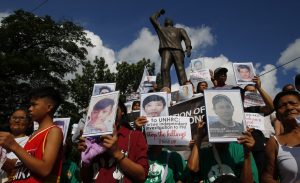Philippine President Rodrigo Duterte’s violent drug war has left thousands of children suffering physical and emotional trauma and deepened cycles of poverty, a new Human Rights Watch (HRW) report said.
The report, released Wednesday, also said dozens of children under 18 have been killed during anti-drug raids either as targets or as bystanders – which Philippine authorities have called “collateral damage.”
Children who have lost family members to the drug war have left their homes and gone into hiding, left school to work, or developed aggressive behavior, said the report, titled “‘Our Happy Family Is Gone’: Impact of the ‘War on Drugs’ on Children in the Philippines.”
The report also renewed a call for a UN probe into an anti-drug campaign police say has killed more than 6,000 suspected drug personalities. The country’s rights commission estimates up to 27,000 have been killed, including those killed vigilante-style by unidentified gunmen.
“Filipino children have suffered horribly from President Duterte’s decision to unleash the police and their hit men against suspected drug users,” HRW Philippines researcher Carlos Conde said in a statement. “The UN Human Rights Council should create an international inquiry and press the Philippine government to end its deadly ‘drug war.’”
“Without action now, an entire generation of Filipino children will be victimized by the violence of Duterte’s anti-drug campaign,” he said.
Duterte’s drug war stemmed from a 2016 campaign promise to conduct deadly operations to kill drug dealers and users without due process. Police generally accuse victims of resisting arrest and fighting back.
To date, only one case has resulted in the convictions of police officers: the August 2017 killing of 17-year-old Kian delos Santos, which was captured on video. The CCTV footage, along with witness testimony, debunked claims by police that delos Santos had fired at police officers.
The death of delos Santos was one of 23 documented by the report, which showed the impacts of the killings of families, especially on small children who lost a parent or relative.
Karla, the child of “Renato A.” – a man killed in December 2016 – told HRW she hid behind her aunt’s coffin as a gunman fired at her father. “I saw everything, how my papa was shot,” she said. “Our happy family is gone.”
Robert, Renato’s eldest child, said his younger brother, John, “easily gets angry now and has lost trust in people.”
“Ever since my father died, I don’t see him happy anymore. If I see him smile, it’s forced,” Robert said of his brother. (HRW changed the names of children and adults in the report for privacy and to protect them from consequences.)
Drug killings peaked from mid-2016, after Duterte’s election, to 2017, concentrated mostly in Metro Manila. Although killings have declined since then, they remain common in the Philippines and have escalated in some areas such as Cebu City, the report said.
In April, Al Jazeera reported drug war killings continued during COVID-19 lockdowns in Cebu and found inconsistencies in police reports.
But the effects of the drug war’s peak continue to impact children left behind. They are often forced to work at a young age and face bullying and discrimination when they do go to school. Affected children must rely on religious groups, NGOs, and community groups for psychosocial therapy or other resources, the report said.
The Philippines Securities and Exchange Commission has nevertheless instituted new guidelines for nonprofits receiving foreign funding, a move widely interpreted as cracking down on organizations critical of the Duterte administration, the report noted.
Last year, several NGOs saw their funds frozen over unsubstantiated allegations they were “front” organizations for the communist New People’s Army (NPA) rebel group and its banned political wing, the Communist Party of the Philippines (CPP).
According to the HRW report, the Philippines government has devised no programs to address the issues faced by children affected by drug war killings. HRW said it spoke to a former top official from the country’s Department of Social Welfare and Development who said that, under Duterte, there has never been a single cabinet meeting at which the effects of the drug war on children were addressed.
The report comes weeks before the Office of the UN High Commissioner for Human Rights is expected to submit a report on human rights in the Philippines to the Human Rights Council.
In 2018, Duterte withdrew the Philippines from the International Criminal Court after it opened a preliminary examination into the drug war.
Opposition Senator Leila de Lima, who investigated drug-related killings in Davao when Duterte was that city’s mayor, was detained three years ago after starting a Senate probe into Duterte’s drug war. She remains imprisoned and has reportedly been kept in solitary confinement since April 25.

































